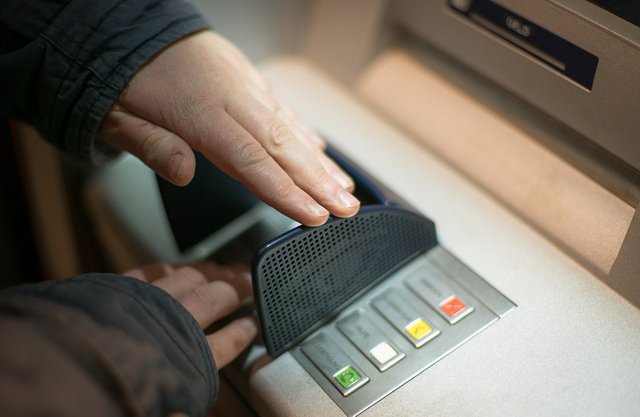Tips to Reduce the Risk of Falling Victim to Scams and Identity Theft
Criminals may buy your credit card and personal info on the dark net for a small fee, or use a "skimmer," which is a device that is added to an existing card reader (such as an ATM, at the cash register, on a gas pump, etc.), which allows them to record all the data shared during your transactions, including account numbers, cards, PINs and more, which they can then use to steal your money. Security breaches of companies, including credit bureau Equifax, have caused the leak of private information on millions of consumers in the US alone, and these problems continue to happen.
Some thieves prefer to go through your mail and/or your garbage to find important information. Many things that arrive in the mail and much of what you send out contains information that they can use to invade your privacy, steal your private information for identity theft, or even gain access to your financial accounts. Hackers employed by Russia, North Korea, China, Iran and other countries, as well as criminals, work hard to get your data, which is why the Trump administration is forcing the sale of US assets of TikTok - to protect Americans from identity theft.
What to Do
This isn't an exhaustive list of things you can do to reduce your risk, but it'll help. Choose what you want - I've tried to break them down into different categories although some really fit multiple categories. :)
Remove Yourself from Mailing and Calling Lists
I've done pretty much all of these and I now rarely see junk mail or get phone calls - even from the scammers.
- So that banks stop sending you pre-approved credit card and insurance offers from the Consumer Credit Reporting Industry (Experian, Equifax, TransUnion and Innovis), call 888-5-OPTOUT (1-888-567-8688). I found it difficult to complete, especially when inputting my address, which it got wrong (the system always turned my street name into something bizarre) so many times it finally just recorded me saying my address. You may also go to their website to opt out (or in). OptOutPrescreen.com You can choose either to opt out for 5 years or permanently.
- Stop online advertisers from tracking you online by opting out via the Network Advertising Initiative.
- Your Ad Choices: IBA Status Check and then Opt Out of Interest-Based Advertising (IBA)
- Get off commercial US Email lists - the DMA will send an email to each email address you register, and you must click the included link within 30 days in order to be opted out.
- Put yourself on the National Do Not Call Registry or call 1-888-382-1222 or for TTY (hard of hearing) 1-866-290-4236. This will get rid of most sales calls (but nothing else, and certainly not from unscrupulous sellers, con artists and other criminals). Contact after you sign up is almost definitely from unscrupulous companies and criminals, so you can feel safe to hang up on them. You can also report scam calls to the FTC this way. If you're actively reporting these illegitimate calls, emails, etc. to the authorities, it helps them to find and stop criminals.
- Get off the Acceptable Ads list. The "Acceptable Ads Exchange" (AAX) list is used by some ad vendors to make sure that the only ads you see are 'interest-based ads'. Of course, if they know your interests, someone is tracking you. Be advised that some ad blocking browser plug-ins use AAX but, at least with some, you can turn it off. uBlock Origin doesn't allow selected ads, but Ad Block Plus does.
I would like to point out that if you want to choose between ads and tracking, you should definitely choose to keep ads. Why? Because if a website has enough revenues from ads (and associate sales links), it really has no excuse to use tracking and other methods to collect data about you, so you can feel comfortable to use something that blocks tracking. Alas, blocking tracking isn't as easy as blocking ads. I've tried multiple plug-ins to prevent tracking and none of the ones I've tried can make it fully automated. Sometimes, blocking tracking will cause a website to load incorrectly, or certain functions won't work, which means you'll have to manually go in and try to figure out what's causing the problem(s).
Report
Report online scams to other agencies, such as the FBI's Internet Crime Complaint Center (IC3)

(source: www.ic3.gov)
If someone who says they are from the Social Security Administration (SSA) calls, do not give them money or personal information and hang up! Report the scam to the SSA's fraud team!
Keep Your Eye on Your Financial Pulse
- Get a free copy of your credit report each year at websites like Annual Credit Report and Free Score Online from Equifax, Experian and TransUnion (lesser credit bureaus like Innovis, PRBC, SageStream, and ARS are not listed here), and check it for errors and indications of fraud. Studies over the past 25 years have consistently shown that credit bureaus make a LOT of errors.
- Also note that 3rd-party companies that provide credit and/or criminal background checks are not required to provide your information yet may have errors.
- Use an app like Credit Karma (based on data from TransUnion and Equifax), Credit Sesame (based on data from Experian), Credit (based on data from Experian), CreditWise (based on TransUnion data), Intuit's Mint (based on data from Equifax), Experian's app, and TransUnion's app. Note that NONE of these show you your FICO score, and most are based on data from only ONE of the big 3. Most of these apps have no or minimal fees.
- Check your financial statement monthly for purchases you didn't make and immediately report it to your credit union/bank.
- To avoid the risks of mailbox theft, use a locked mailbox and make sure that it doesn't have a standard lock & key (a universal key - more info here: What the Lock Industry Doesn't Want You to Know!.
- Don't drop bill payments and such in an insecure mailbox and put the flag up. Instead, drop your payments into a government mailbox or take them to the post office, or pay online. That'll keep identity and credit card thieves from getting info, card numbers and checks they can duplicate, or getting the info they need to set up accounts in your name (that you pay for) but they use! Just because it's a federal crime to tamper with the mail doesn't mean that criminals won't do it!
Credit/Debit Cards
- When typing in a password at an ATM, on a card reader, or in a public place, ALWAYS block the view so that people nearby with high-powered cameras, people behind you, and others cannot see what you type in.
- When using an ATM, card reader or gas pump, inspect the card scanner and keyboard area to make sure they're not actually a "skimmer" added on by criminals. They'll be made to look like they belong but you may notice similarities. Skimmers allow you to complete transactions while recording your card info and PIN, which the thief later retrieves.

- Instead of signing your card, write "Check ID please".
- Even better, get your cards with your photo ON them permanently.
- If you have a smart chip card, buy a skimmer blocker to put it inside of. These are cases that prevent scanning; a criminal can walk by you and quickly scan your card in less than a second as long as they're close enough.
Internet
- If there's a link to follow, make sure you look carefully at the spelling (e.g. "Facbook" instead of "Facebook") and the full name of the site (fake: "www.facebook.got.com", "payments.paypal.financialrulez.com", "wellsfargo.time4investing.com", "purchases.online.kohls.buyingfrenzy.net") - only the last two parts of a URL matter!
- Savvy criminals will work online using various types of programs to keep track of your whereabouts (they love it when you post your schedule, pictures of your keys and home, location announcements and more) so they know when it's going to be safe to enter your home. Therefore:
- don't let most apps have access to your location
- don't post anything about your schedule, upcoming vacation, and announcements about where you are (or will soon be)
- don't post pictures of ANY of your keys (if the photo is good enough, they'll be able to use it to make a copy)
- don't post pictures or a video tour of your home, which effectively gives them a map and helps them to know the layout of your home, what's valuable and where to look for hidden valuables, which will greatly reduce the time they have to be inside), etc.
- don't use the same password on numerous websites, devices and cards
- use anti-tracking browser extensions/add-ons/plug-ins/apps
- How to Live Without Google: Alternatives That Protect Your Privacy
- turn off Google tracking you (and other stuff): Google Sees Everything You Do: Here's How to Stop That
- Turn On or Off Clear Browsing Data on Exit for Current User in Microsoft Edge Settings
- Firefox: How do I turn on the Do Not Track feature?
- Prevent cross-site tracking in Safari on Mac
- Alternatively, you can open a special "private/confidential/incognito" browsing window that doesn't allow tracking in some browsers. You can also download the TOR browser, which is supposedly to totally anonymize your browsing from snooping third parties. Keep in mind that ALL devices and browsers are subject to surveillance by governments and companies - no matter what they tell you to the contrary.
- Use anonymous search engine DuckDuckGo, which doesn't track what you search for and doesn't save your search history, unlike most other search engines.
- disable third-party cookie usage in your browser
- only use add-ons that you know are trustworthy because many companies that make them now use them to spy on you, and then sell the (personal or aggregate) data
- Read Common Sense Media's "Your Family Has a Right to Privacy Online"
- Even if you don't live in California, learn about the CCPA: Use the California Consumer Privacy Act to protect your personal information. Some companies are applying it to people from other states.
- When you get messages online via a pop-up on your computer that you weren't expecting, don't click on them except to click the "X" button. Some of these messages are designed to trick you into giving criminals the right to install malware on your computer.

- If you get a message in your email, text messages or via social media, be careful about any links. Carefully inspect a link's address for flaws, such as a mis-spelled company name or website address (e.g. Wagreens.com instead of Walgreens.com), an email address that isn't to the company's name (e.g. @gmail.com instead of @fbi.gov)
- If someone sends you a message that doesn't include a typical greeting and a description, but has an image or link to follow, ask them what it is. If they don't answer, don't touch it. There's a chance that their account was hacked. Contact them another way and try to verify.
- Limit the information you share online about yourself. Anything about current or future plans that will take you away from your home, what your normal work schedule is like, or anything else a criminal would want to know about that would make it easier to find the best times to enter your domicile. Some thieves only enter to steal sensitive information or go through your garbage and take things from your mailbox.
- Never post information that is typically used for identity verification (e.g. date of birth, mother's maiden name, SSN) or for security questions (e.g. "What was your first pet's name?", "Where did you go to elementary school?", "What was your first car?"), in addition to any other information that might be used in a sensitive context. This information is surreptitiously collected not only by governments and their agencies but also by some companies, as well as criminals.
Phones
- This article explains how phones track stuff about you.
- don't take photos with location-tracking turned on because that data can be used by criminals to find out where you go, including your children's frequently visited places

- only use apps that you know are trustworthy because many companies that make/distribute them now use them to spy on you, and then sell the (personal or aggregate) data or, worse yet, rob you
- If someone sends you a message that doesn't include a typical greeting and a description, but has an image or link to follow, ask them what it is. If they don't answer, don't touch it. There's a chance that their account was hacked. Contact them another way and try to verify.
- When you get a call and it sounds like a computer is talking, or you can tell it's a computer because its responses are too simplistic or are often incorrect, it's best to hang up because robocalling is illegal in the US except for political and charity calls.

- If an unknown person calls and leaves voicemail, from a known company, agency or governmental department, never trust the number they leave, or even the number you see displayed. They can set up a fake phone number or even trick your phone into displaying an official phone number. Always look up the number in the phone book or online and find it yourself to make sure you're not calling a scammer back.
- If you've got time, keep scammers communicating with you while you either contact the authorities or make them waste their time. I had fun wasting the time of some Mexican "free" vacation scammers once.
- If someone calls you on the phone, keep them on the phone as long as you have time for and then, at the end, don't buy ANYTHING. Just end the call. Common scams include: student loan forgiveness, car warranty, the IRS is going to prosecute you, free overseas vacation (they usually mention a famous hotel that "you booked at"), an unexpected call about your computer where they claim they will fix something broken or hacked, and many more!
Garbage/Recycling
- Shred any documents you throw out that contain anything sensitive (e.g. credit/debit card info, bank/credit union info, date of birth, where you were born, historical info commonly used for security questions, etc.

Miscellaneous
- Research. Some YouTubers do this to specific categories of criminals, such as tech support scammers, con artists who target the elderly, and more, and then share their recordings on their channel so you can see the tricks these scum use to relieve you of your money and identity. You can learn a lot from watching these games of wit.
- Con artists have weaknesses, too, such as pride/arrogance, over-inflated sense of self, feeling mentally superior, feeling entitled to what others have, and greed, to name a few. Push the right buttons and you'll throw them off.
- When you make decisions, don't do it based on your emotions - you'll almost always regret it.
- Read this Reader's Digest article on identity theft to learn ways that they get access to your identity
Do you know of any tips that would help others? If so, please leave them in the comments and I'll add them! Thanks! 😃
If you appreciate this article, please 🏅upvote/like👍 , 🤩resteem/share
, 🤩resteem/share and share it to Facebook
and share it to Facebook , Twitter
, Twitter , Reddit
, Reddit , LinkedIn
, LinkedIn and wherever else
and wherever else you can!
you can!